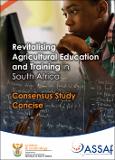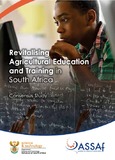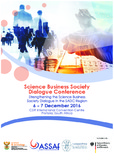| dc.contributor.author | Academy of Science of South Africa (ASSAf) | |
| dc.date.accessioned | 2018-04-13T06:56:40Z | |
| dc.date.available | 2018-04-13T06:56:40Z | |
| dc.date.issued | 2017 | |
| dc.identifier.citation | Academy of Science of South Africa (ASSAf), (2017). Revitalising Agricultural Education and Training in South Africa (Concise). [Online] Available at: DOI http://dx.doi.org/10.17159/assaf.2016/0016 | en_ZA |
| dc.identifier.isbn | 978-0-9947117-1-7 | |
| dc.identifier.other | http://dx.doi.org/10.17159/assaf.2016/0016 | |
| dc.identifier.uri | http://hdl.handle.net/20.500.11911/97 | |
| dc.description | Cite: Academy of Science of South Africa (ASSAf), (2017). Revitalising Agricultural Education and Training in South Africa (Concise). [Online] Available at: DOI http://dx.doi.org/10.17159/assaf.2016/0016 | en_ZA |
| dc.description.abstract | The consensus study was initiated by the ASSAf Science, Technology, Engineering and Mathematics (STEM) Education Standing Committee, deriving from a deep concern about the status of Agricultural Education and Training (AET) in the country. The study seeks to identify and address the challenges facing the AET sector in South Africa. It is a timely study given the important role that this sector needs to play in meeting the United Nations’ Sustainable Development Goals.
The study aims to provide evidenced-based information and clear recommendations to policymakers and other relevant stakeholders with an interest in agricultural human capital development. Some of the key findings of the study include inadequate funding for practical-level training; weak linkages to industry for understanding training needs; poor quality and inadequate numbers of educators who are appropriately trained to teach agriculture at school level; and poor linkages in the research–teaching–extension nexus. The recommendations are wide-ranging and very practical. It is hoped that they will be used to influence policymakers and thereby result in an improvement in the quality of AET in South Africa.
Although specifically focused on South Africa – a collation and analysis of international practice within the South African context – the report is potentially a useful resource for other countries on the African continent seeking to strengthen their own AET systems.
The report was developed and guided to its successful conclusion by an 11-member study panel of experts, under the leadership of Prof Frans Swanepoel. It was peer-reviewed by three experts and will be made available in an open accessible and free format. | en_ZA |
| dc.description.sponsorship | Agricultural Research Council (ARC) | en_ZA |
| dc.language.iso | en | en_ZA |
| dc.publisher | Academy of Science of South Africa (ASSAf) | en_ZA |
| dc.subject | Agriculture | en_ZA |
| dc.subject | Agricultural Research | en_ZA |
| dc.subject | Agricultural Education and Training | en_ZA |
| dc.subject | Agriculture Development Programme | en_ZA |
| dc.subject | Economic Research | en_ZA |
| dc.subject | Education and Training | en_ZA |
| dc.subject | Agriculture Technical | en_ZA |
| dc.title | Revitalising Agricultural Education and Training in South Africa (Concise) | en_ZA |
| dc.type | Consensus Study Report (Concise) | en_ZA |
| dc.identifier.doi | 10.17159/assaf.2016/0016 | |
| assaf.peer-review.status | Peer-Reviewed | |




